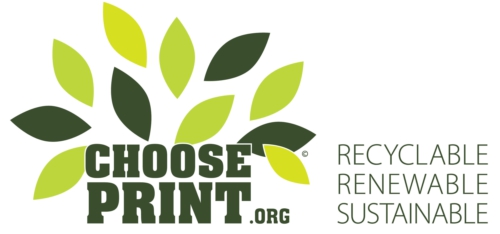Usage of paper is a sustainable environmental choice as it is both renewable and recyclable. Contrary to popular belief, print on paper is not causing climate change, global warming, or depleting our forests.

Choose Print as Part of Your Marketing Mix- An educational campaign on the effectiveness and environmental sustainability of print. (PRNewsFoto/Printing Industries Association, Inc. of Southern California)
Choose Print, an educational campaign for promoting the effectiveness of print, has released facts on trees, paper, recycling and refills.
The primary material for manufacturing paper is wood from trees. Trees can be replenished continually. The U.S. utilizes its self-produced wood in around 90% of its paper and paperboards. Of the wood supplied, federal supply contributes 2%, state and tribal 6%, and privately owned forests 91%. Growth of forests in the US exceeds harvest by a significant 37%.
Paper is a significantly small user of forest resources. Only 11% of the global forests are being used. Generally, waste and scrap are used for making paper. Wood chips and sawmill scrap contribute 33%, recycled paper 33% and virgin trees contribute 33%.
Plastics contribute to 17.3% of discards into landfills, while paper and paperboard are 16.2%. In 2010, the U.S. recovered 66.8% of its paper consumption from recycling.
Greenpeace Co-Founder, Dr. Patrick Moore, stated that in order to address climate change, more wood needs to be used. This will cause businesses to grow more trees for wood production. Trees are renewable and biodegradable. Usage of more wood will lead to lesser usage of plastic, steel and concrete, which emit huge amounts of carbon during their production.
Disclaimer: The views expressed here are those of the author expressed in their private capacity and do not necessarily represent the views of AZoM.com Limited T/A AZoNetwork the owner and operator of this website. This disclaimer forms part of the Terms and conditions of use of this website.